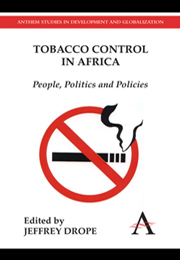Book contents
- Frontmatter
- Contents
- List of Figures and Tables
- Foreword
- Preface
- Acknowledgments
- List of Abbreviations and Acronyms
- 1 Introduction
- 2 The Political Mapping Process
- 3 Progress on Smoke-Free Policies
- 4 Taxation as a Tobacco Control Strategy
- 5 The Challenges of Implementing Bans on Advertising, Promotion and Sponsorship
- 6 The Pursuit of Packaging and Labeling Requirements
- 7 Burkina Faso
- 8 Cameroon
- 9 Eritrea
- 10 Ghana
- 11 Kenya
- 12 Malawi
- 13 Mauritius
- 14 Nigeria
- 15 Senegal
- 16 South Africa
- 17 Tanzania
- 18 Zambia
- 19 Conclusion: Tobacco Control in Africa – People, Politics and Policies
- Notes on Contributors
- Index
4 - Taxation as a Tobacco Control Strategy
Published online by Cambridge University Press: 05 March 2012
- Frontmatter
- Contents
- List of Figures and Tables
- Foreword
- Preface
- Acknowledgments
- List of Abbreviations and Acronyms
- 1 Introduction
- 2 The Political Mapping Process
- 3 Progress on Smoke-Free Policies
- 4 Taxation as a Tobacco Control Strategy
- 5 The Challenges of Implementing Bans on Advertising, Promotion and Sponsorship
- 6 The Pursuit of Packaging and Labeling Requirements
- 7 Burkina Faso
- 8 Cameroon
- 9 Eritrea
- 10 Ghana
- 11 Kenya
- 12 Malawi
- 13 Mauritius
- 14 Nigeria
- 15 Senegal
- 16 South Africa
- 17 Tanzania
- 18 Zambia
- 19 Conclusion: Tobacco Control in Africa – People, Politics and Policies
- Notes on Contributors
- Index
Summary
Despite the demonstrated efficacy of increased tobacco taxation as a primary deterrent to tobacco use, the vast majority of the countries participating in the Africa Tobacco Situational Analyses (ATSA) initiative do not yet employ taxation as a tobacco control strategy. Though all 12 ATSA countries levy taxes on tobacco products, only South Africa has been able to create, implement and enforce significant tobacco taxation aimed purposefully at reducing consumption. This chapter seeks to furnish a regional context of tobacco taxation in Africa and to analyze the challenges that countries face in attempting to utilize such policy instruments.
Tobacco taxation generates a distinct set of important policy dynamics that merit serious consideration, particularly for advocates seeking policy change. Proponents of tobacco tax policy reform – i.e. targeted tax increases – must take their well-researched, ironclad case for change to government in order to convince them of the tangible revenue and public health benefits. They also have to be prepared for vigorous opposition from the tobacco industry and/or their allies, which will inevitably present a doomsayer scenario of decreased tax revenue and job loss. On the side of actual policy provision, proponents within government must develop policies that will be effective over the long term, particularly instituting a codified system of substantial specific excise tax increases that will account effectively for changes in personal income and inflation. Proponents within the government must also be prepared for opposition from colleagues towards these reforms, based on concerns over their constituency support and/or ideological preferences (e.g. lower taxes).
- Type
- Chapter
- Information
- Tobacco Control in AfricaPeople, Politics and Policies, pp. 43 - 62Publisher: Anthem PressPrint publication year: 2011
- 1
- Cited by

